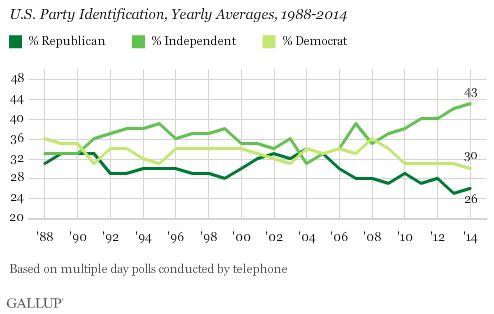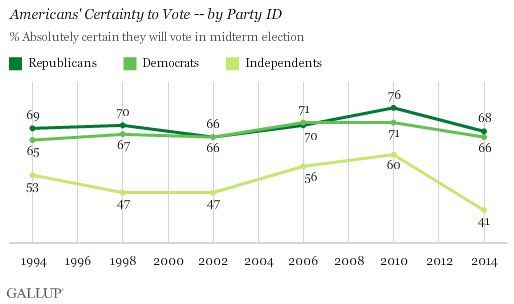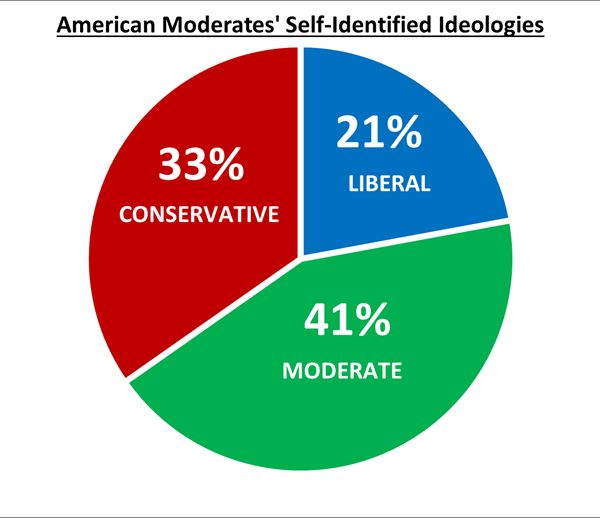Why Don't Independent Voters Unite?

As many readers of IVN may already know, 43% of American voters self-identify as independents, and that number looks like it's going to continue to climb.

A reader on my own blog recently asked me, "what's preventing Independents from uniting and becoming a new majority, perhaps as the Modern Whigs?"
The common wisdom on the matter is that the Republican and Democratic parties are "too entrenched." I won't make the argument that the two-party system isn't deeply-entrenched, but it is entrenched in particular ways:
- America's first-past-the-post, constituent-based voting system means that two parties will dominate Congress (A theory on how our voting system drives a two-party result can be found here);
- A well-established party fundraising machine blocks unaffiliated candidates from victory; and
- Rules of the FEC and major news networks prevent low-likelihood candidates from participating in debates, which is ultimately a self-fulfilling prophecy.
Realignments and the Rise and Fall of American Parties
But none of these factors mean that it must be specifically the Republicans and Democrats that dominate the system. Throughout the history of the United States, parties have risen and fallen: the graveyard of major parties includes Federalists, Anti-Federalists, Democratic-Republicans, and Whigs.
More telling, perhaps, was the realignment of the Republican and Democratic parties in the 1960s, as the Republicans shifted from their northeastern base to the south and heartland, and the Democrats shifted to the coasts. The parties are dominated by new demographic groups and have fairly different platforms from what existed before 1960.These realignments often occur when a single party fractures into parts, and a new, odd "alliance" is built between different interest groups, which is why parties don't always seem ideologically aligned. These new alliances form into new parties that stabilize around new demographic and ideological groups.
The fleeing of voters from both parties suggests that they are crumbling, and one might believe that a realignment is due.
But a number of factors are holding back such a realignment driven by independents.
United by Disengagement
Moderates stand out from Republicans and Democrats by being disengaged. They're significantly less likely to vote than either of the parties.

This shouldn't surprise us: there's a reason that independents left the two-party system, and when the only candidates available will come from the two-party system, they're likely to vote less often.
But the precipitous drop-off of voting interest in 2014 correlates with the rapid rise in independents after 2010, suggesting that these newcomers are people that have given up altogether.
A Moderate Myth
More important in explaining why independents don't unite is that they're simply not an ideologically-united group. This is also not surprising.
What might be surprising is that they're actually not particularly moderate, either. About 41% of Independent voters are moderate, which is not much more than the 34% for the country as a whole.
While some believe that independent voters leave the parties because they don't fit into the party ideological camps, this is usually not true. Most surprisingly, the portion of independent voters who identify as moderate has been trending down over the past six years, from a peak of 46%. As moderates grow more partisan, the likelihood of forming a moderate political force shrinks over time: while independent voters are united by mindset, it is indeed platform and ideology that unites a political party, and that platform simply doesn't exist for this group.
The Long Game
Ultimately independents aren't set up to form any serious organized political opposition to the Republicans or Democrats anytime soon.
But the long game may grow more interesting. While the parties don't need to win independent registration in order to win elections, they may risk political legitimacy in the long term if their share of total voters drops too low. If only 20% of voters were affiliated with a party, mass frustration with disenfranchisement could spur a major realignment in the next few decades -- but that's pure speculation.
Photo Credit: Joseph Sohm / Shutterstock.com




